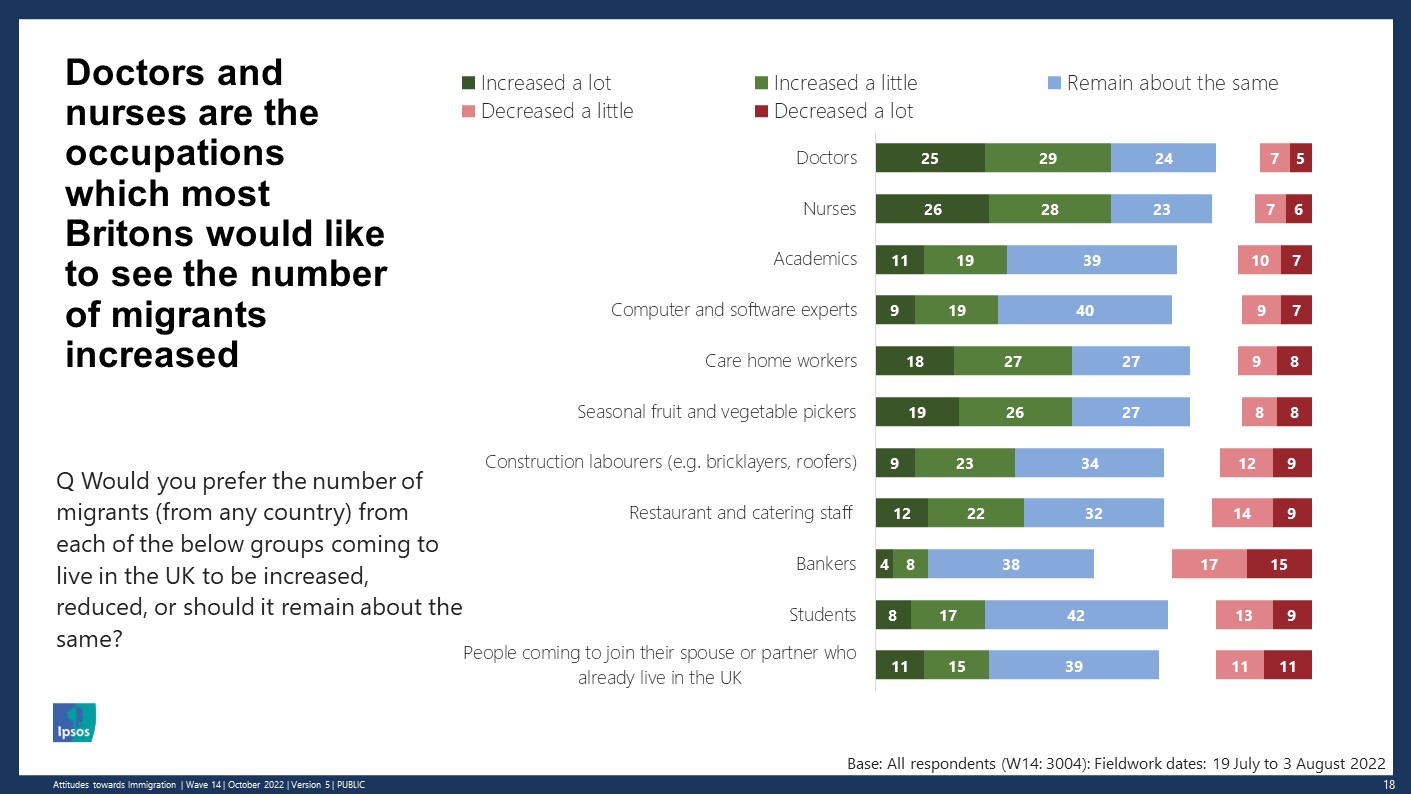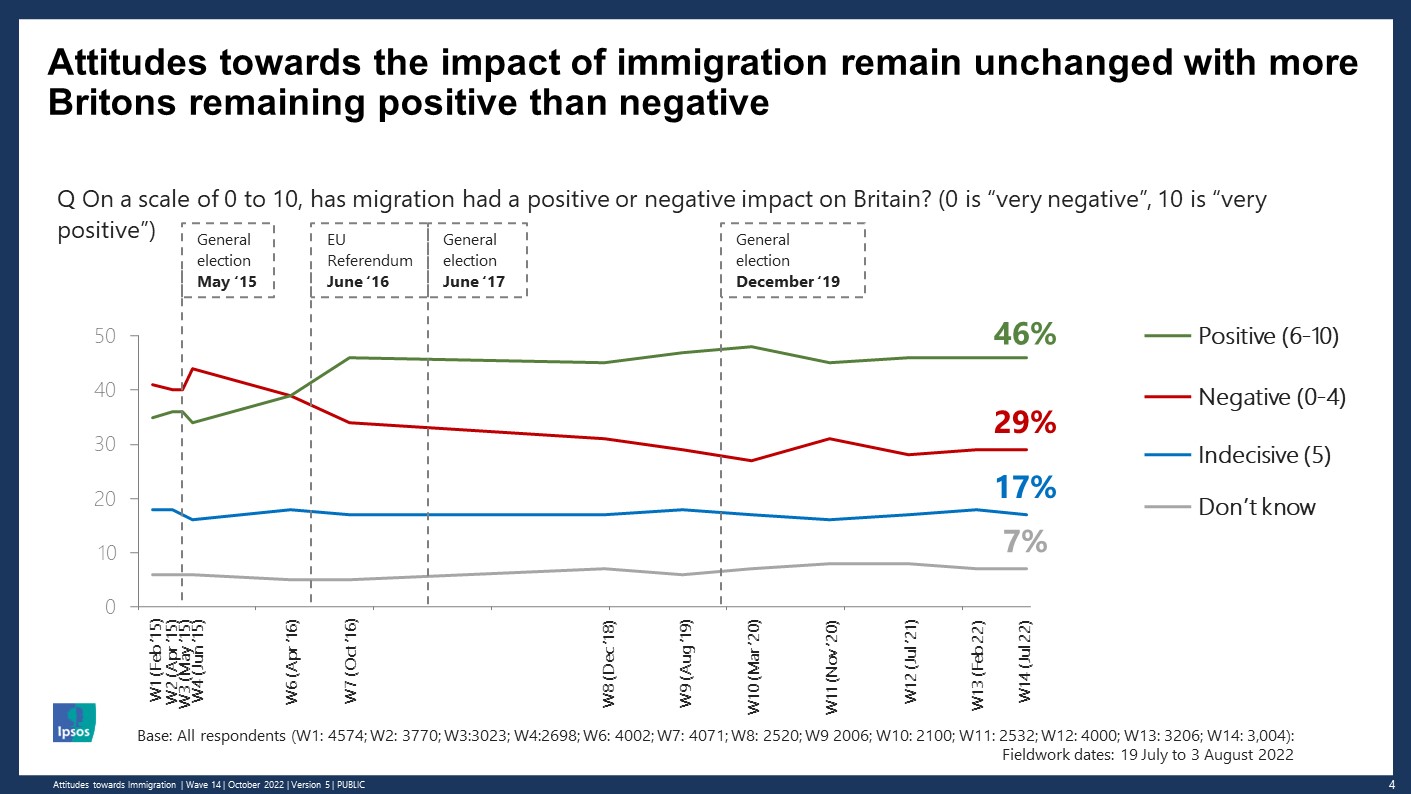Public attitudes to immigration shows public take a balanced approach
- Support for increased immigration for some specific sectors and jobs such as doctors, nurses, care home workers and fruit-picking.
- Most people don’t think the Rwanda asylum scheme will reduce asylum applications or offer value for money though overall support is divided
As the Cabinet debates a choice over whether relaxing some immigration restrictions could help the economy to grow, while other Cabinet voices prioritise cutting overall numbers, a new report published today (11 October) shows where the public is on this important question. The Ipsos tracker research for British Future has tracked shifting public attitudes to immigration since 2015 and finds a nuanced picture with pragmatic public permission for a balanced approach.
More than twice as many people would increase rather than decrease migration for people coming to the UK to work as seasonal fruit and vegetable pickers, care workers, doctors and nurses. More than half the public want more doctors and nurses from overseas; 45% want more fruit-pickers and 44% more care workers. Fewer than one in five support reducing immigration to any of these roles.
A third of the public also support increased immigration to fill staff shortages in hospitality (34%) and construction (32%), with a further third preferring to keep immigration levels for these jobs as they are now. Less than a quarter of people would support reducing immigration for construction labourers (21%) and restaurant and catering staff (23%).

Migration to study at UK universities – which Home Secretary Suella Braverman has recently suggested she would like to reduce – is also popular with the public at current levels. Around one in five (21%) would reduce international student numbers while two-thirds would prefer numbers to stay the same (42%) or increase (25%). Only 29% of Conservative supporters support reducing student migration.
For immigration overall, support for reducing immigration remains at its lowest level since the tracker survey began in 2015. Four in ten people (42%) would prefer immigration to be reduced, 26% that it stays the same and 24% that it increases.
The findings reflect the gradual warming of public attitudes to immigration since the run-up to the EU referendum. The latest findings show that more people feel that immigration has had a positive effect on Britain (46%) than a negative effect (29%). When the tracker survey was first conducted in February 2015, by comparison, it found only 35% were positive while 41% were negative.

Few people are aware of this positive shift in attitudes, however. Only 10% of respondents felt that the general public’s views on the impact of immigration had become more positive over the last few years, while 54% felt that people had become more negative about immigration.
The new research finds the public divided over the government’s controversial Rwanda asylum scheme, with 21% strongly opposed and 21% strongly supportive. Overall, 40% say they support the scheme and 33% say they are opposed.
However, most of the public (52%) and 43% of Conservative supporters, do not think the Rwanda scheme is likely to succeed in reducing the number of people coming to the UK to seek asylum without permission. Just over a third of the public (36%) think the scheme is likely to reduce the number of people coming to the UK to seek asylum without permission. A similar proportion, 34%, think it likely the scheme will discourage genuine refugees from applying for asylum.
Only a quarter of the public (25%) and a minority of Conservative supporters too (38%) think the Rwanda scheme is likely to offer value for money. A majority of the public (55%) think it is unlikely to offer value for money.
Sunder Katwala, Director of British Future said:
Liz Truss and Suella Braverman have pragmatic permission from the public to welcome more overseas workers to fill labour and skills gaps and help economic growth. That’s because overall numbers matter less to the public now: their priority is that immigration is controlled, rather than reduced.
They inherit a less heated immigration debate as a legacy of Boris Johnson’s ‘control not reduce’ approach. This asserted UK control over migration policy, by ending free movement, but allowed immigration for work and study to increase.
The debate about asylum and Channel crossings is more polarised. Most people want something to be done about Channel crossings. But there is no public majority in support of the Rwanda scheme as the answer: most people think it will be ineffective and a waste of money.
Gideon Skinner, Research Director at Ipsos, said:
Public attitudes remain more nuanced on immigration than people might expect, with no blanket views on either side. For example, while there is little demand for increases in immigration overall, there is support for allowing more workers across a range of sectors where the public sees a need, while dissatisfaction with the number of channel crossings is combined with sympathy for the refugees themselves.
This regular tracking research helps us understand these views and how they are changing – as well as highlighting misperceptions among the public themselves. In particular, most people think their fellow citizens have become more negative towards immigration over the last few years but in reality attitudes have become more positive since before the Brexit referendum.
Tech Note
Ipsos interviewed a representative sample of 3,004 online adults aged 18+ across Great Britain between 19 July - 3 August 2022. Data are weighted to reflect the population profile. All polls are subject to a range of potential sources of error.
The survey was conducted in collaboration with British Future with funding from Unbound Philanthropy and the Barrow Cadbury Trust.





